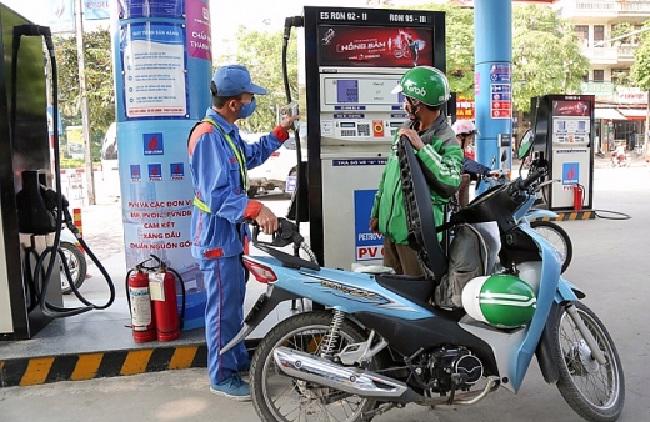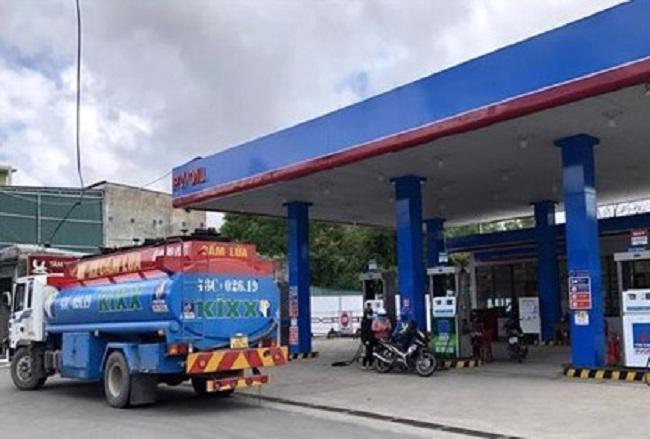[ad_1]
The Confederation of Trade and Industry of Vietnam (VCCI) has just sent a document to the Government Office requesting comments on the draft Decree amending and supplementing Decree 95/2021/ND-CP and Decree 83/2014/ND-CP on the petroleum business sent .
MARKET INTERVENTION IN A GREAT WAY
In the document, VCCI explained that many retail companies have recently reported no or even negative retail discounts. This leads to retail stores not wanting to sell but being forced to otherwise face sanctions from the authorities.
It should be noted that in the event that the operating retail price is below the full cost of the supply chain, companies in the supply chain have no incentive to do business. The state requires companies to do business to supply petroleum to the economy, the negative costs in excess of that selling price will surely be borne by someone in the supply chain.
According to VCCI, under the current regulatory design, this negative amount will mainly flow to the retailer when the retail operating price is lower than the cost, since the wholesaler has the right to take the initiative on the wholesale price and not be penalized for stopping the sale. Therefore, the key question remains how to deal with the gasoline retail price mechanism.

The state intervenes halfway into the market.
Many companies have petitioned the VCCI to propose that the government and Department of Industry and Trade set a minimum discount rate for retail outlets. The Ministry of Industry and Trade offers two options in this regard.
option 1 The discount rate is not specified.
plan 2 is intended to prescribe the minimum discount rate in the petroleum business.
The Department of Industry and Trade has chosen Option 1 as the relationship is civil and the initiative is for business.
However, it should be clear that by using this method, the state is semi-interfering in the market. On the one hand, the state respects civil law relations by not imposing minimum discounts or maximum wholesale prices, and by not penalizing wholesalers if they stop selling. On the other hand, the state interferes with retailers’ freedom to do business by setting maximum retail prices and imposing sanctions if retailers stop selling. It is the inconsistency of these policies that has caused the collapse of the oil supply chain to spread across the country in recent years.
For this reason, VCCI suggested to the editorial agency that the regulations be adjusted accordingly.
The first, If the state does not intervene in the price so that market supply and demand determine the price, the minimum retail rebate level is not regulated.
Monday, If the state continues to intervene in retail prices, it is necessary to manage the minimum discount (or maximum wholesale price) at the same time to ensure the consistency of the management mechanism.
ALLOWS RETAIL AGENT TO RECEIVE POLICY FROM MULTIPLE SOURCES
According to the draft decree amending and supplementing Decree 95/2021/ND-CP and Decree 83/2014/ND-CP on the petroleum business, the Ministry of Industry and Commerce offers two options, not allowing (option 1) and allowing ( Option 2) Gasoline and Oil retail stores to source goods from many sources.
In this regard, VCCI recommends Option 2, which allows retail stores to source gasoline from many sources. Although they also agreed to choose Option 2, the Ministry of Industry and Trade still expressed concerns in the report that such an arrangement would violate the Trade Act, would be difficult to control the quality of the petroleum and without a responsible entity for who would be responsible for supplying petrol to retail outlets when supply is scarce.
However, according to the VCCI, these concerns are not really satisfactory.
The first, This provision is at odds with the Commercial Code as Decrees 95 and 83 state that retail outlets may only sell in the form of agent deliveries. Meanwhile, the retail sale of items can be conducted in many different forms, including agency form, franchising form, and direct buying and selling form, depending on the agreement of the parties.
“The fact that Decrees 95 and 83 do not allow retail businesses to conduct business in the form of fractional purchases and sales violates the right to freedom of business in the Companies Code and the Commerce Code,” stated VCCI.
Monday, The mineral oil quality can still be controlled without restricting the 1:1 distribution ratio. Currently, the parties always take samples and store them when delivering petrol from tanker trucks to retail outlets. If there is a problem with the quality of the gasoline sold to consumers, it is always possible to re-examine the above gasoline samples and trace the source to determine the parties’ responsibilities. Additionally, many petroleum retailers import goods from many outlets, so asking retailers to import from just one source doesn’t make much sense.
Tuesday, The fear that allowing retail companies to import goods from many sources would result in no one distribution unit being responsible for supplying petroleum is unfounded. Currently, when sources of supply are scarce or want to stockpile goods, wholesalers still stop supplying retailers (by raising the wholesale price or cutting the discount) without the law having any way of curbing the situation. Additionally, by allowing goods to be imported from many suppliers, retailers are more proactive and the risk of supply disruptions is reduced.
In this regard, VCCI believes that there is a need to consider an adjustment to allow retail stores to choose a business type, act as an agent or obtain a franchise for a distributor, or choose to buy and sell a business type.

If it is a retail business, acting as an agent or franchisee, only one dealer may import goods. Dealers are responsible for the quality and price of goods in accordance with the law.
If the retail store decides to buy and sell on installments, it is allowed to import goods from many wholesalers. At this point, the retail store is responsible for the quality and price of the goods, in accordance with the law.
In addition, the VCCI is proposing to amend the regulations on the form of the petroleum retail credential to no longer include the name of the wholesaler for the retail outlet.
Regarding the rights and obligations of distributors and general agents, the Ministry of Industry and Trade intends to amend the rule that distributors can only import goods from 03 key dealers and cannot take over goods from distributors. This regulation aims to give wholesalers the responsibility of supplying goods to traders when petroleum supplies are difficult.
VCCI does not consider this concern to be really necessary. When the petroleum supply context is difficult, the fact that wholesalers prioritize selling in their system or selling to other dealers will not change the overall supply on the market.
To address the problem of hoarders, it is necessary to increase the flexibility of the market to make it easier for traders to move goods from places with surplus to places with shortage, rather than restricting or impeding the distribution chain. More importantly, politics must handle the price issue in such a way that the parties have a business motivation. And when the global supply is tight or the price is understated, there is not much difference between wholesalers selling to anyone.
[ad_2]
Source link

